雅思大作文范文电视电影对于少年犯罪的影响
青少年看电视有弊端,谈谈你的看法英语作文
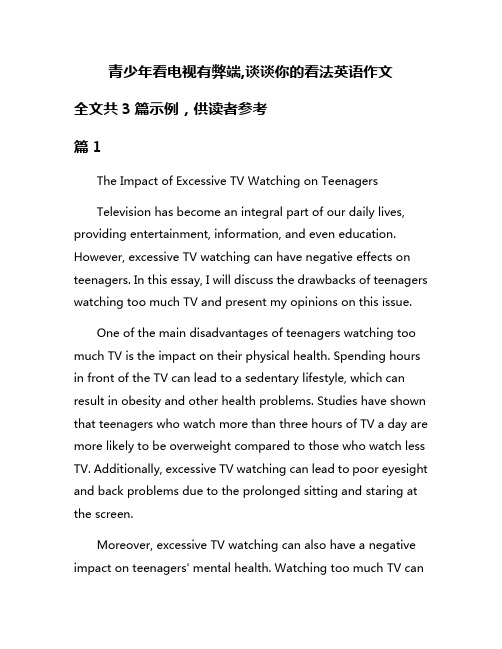
青少年看电视有弊端,谈谈你的看法英语作文全文共3篇示例,供读者参考篇1The Impact of Excessive TV Watching on TeenagersTelevision has become an integral part of our daily lives, providing entertainment, information, and even education. However, excessive TV watching can have negative effects on teenagers. In this essay, I will discuss the drawbacks of teenagers watching too much TV and present my opinions on this issue.One of the main disadvantages of teenagers watching too much TV is the impact on their physical health. Spending hours in front of the TV can lead to a sedentary lifestyle, which can result in obesity and other health problems. Studies have shown that teenagers who watch more than three hours of TV a day are more likely to be overweight compared to those who watch less TV. Additionally, excessive TV watching can lead to poor eyesight and back problems due to the prolonged sitting and staring at the screen.Moreover, excessive TV watching can also have a negative impact on teenagers' mental health. Watching too much TV candecrease the time spent on other activities such as reading, sports, and socializing, which are essential for teenagers' development. It can also lead to a lack of sleep, as teenagers may stay up late watching TV shows, resulting in fatigue and poor concentration at school. Furthermore, the content of TV programs can sometimes be violent or inappropriate for teenagers, leading to increased aggression and desensitization to violence.In addition, excessive TV watching can affect teenagers' academic performance. Spending too much time in front of the TV can distract teenagers from their studies and homework, leading to lower grades and academic achievement. It can also affect their ability to focus and concentrate, as well as their problem-solving skills. Moreover, watching TV for extended periods can reduce teenagers' motivation to engage in more intellectually stimulating activities, such as reading or studying.Despite the drawbacks of excessive TV watching, it is important to recognize that not all TV programs are harmful. There are many educational and informative programs that can benefit teenagers, such as documentaries, news programs, and educational shows. Parents and educators should encourageteenagers to watch TV in moderation, and guide them in selecting appropriate and beneficial programs to watch.In conclusion, excessive TV watching can have negative effects on teenagers' physical health, mental health, and academic performance. It is important for teenagers to limit their TV viewing time, and parents and educators should monitor and guide them in selecting appropriate and beneficial programs to watch. By striking a balance between entertainment and other activities, teenagers can enjoy the benefits of TV without experiencing its drawbacks.篇2Teenagers Watching TV: The Drawbacks and My ThoughtsTelevision has become a ubiquitous presence in our lives, providing countless hours of entertainment and information to people of all ages. However, when it comes to teenagers, the excessive use of television can have several drawbacks and negative impacts on their development. In this essay, I will explore the potential harms of teenagers watching TV and share my thoughts on the matter.The first drawback of teenagers watching TV is the sedentary lifestyle it promotes. Spending hours in front of the screen canlead to a lack of physical activity, which in turn can contribute to a host of health problems such as obesity, heart diseases, and diabetes. Moreover, teenagers who spend too much time watching TV may also neglect other important activities like homework, socializing, or engaging in physical activities.Secondly, television can have a negative impact on teenagers' mental health. Excessive exposure to violence, sex, and other inappropriate content on TV can desensitize teenagers and influence their behavior and attitudes. They may become more aggressive, desensitized to violence, or develop unrealistic expectations about relationships and body image. Furthermore, spending too much time watching TV can also lead to feelings of loneliness, depression, and anxiety, as teenagers may isolate themselves from real-life social interactions.Another downside of teenagers watching TV is the potential impact on their academic performance. Research has shown that excessive screen time can hinder teenagers' cognitive development, attention span, and academic achievements. This is because TV watching can be a passive activity that requires little critical thinking or problem-solving skills, which are essential for academic success. Moreover, spending long hours in front of the screen can disrupt teenagers' sleep patterns,leading to fatigue, lack of concentration, and poor academic performance.In addition to the negative impacts on physical health, mental health, and academic performance, teenagers watching TV can also have detrimental effects on their social skills and relationships. Excessive screen time can limit teenagers' opportunities to interact with their peers, develop social skills, and build meaningful relationships. Instead of engaging in face-to-face conversations or activities, teenagers may prefer to retreat to the virtual world of television, which can hinder their interpersonal communication skills and ability to form meaningful connections with others.Despite the numerous drawbacks of teenagers watching TV, I believe that there are ways to mitigate these negative impacts and promote healthier screen habits among teenagers. Parents, educators, and policymakers can play a crucial role in raising awareness about the potential harms of excessive screen time and encouraging teenagers to adopt healthier screen habits. They can set limits on screen time, encourage teenagers to engage in physical activities, hobbies, or socializing, and monitor the content they are watching on TV. Moreover, parents and educators can also model healthy screen habits themselves andengage in open discussions with teenagers about the benefits and drawbacks of television.In conclusion, while television can be a valuable source of entertainment and information, excessive TV watching among teenagers can have several drawbacks and negative impacts on their development. From promoting a sedentary lifestyle to affecting mental health, academic performance, and social skills, teenagers watching TV can have far-reaching consequences. However, by raising awareness, setting limits, and promoting healthier screen habits, we can help teenagers strike a balance between enjoying television and maintaining a healthy and balanced lifestyle.篇3The Advantages and Disadvantages of Adolescents Watching TVIntroductionTelevision has been a staple in almost every household for decades, providing entertainment, news, and information. While many argue that television can have educational benefits for adolescents, there are also drawbacks to excessive TV watching.In this essay, we will discuss the advantages and disadvantages of adolescents watching TV.Advantages of Adolescents Watching TV1. Educational Content: Many TV programs are designed to educate and inform viewers. Educational channels like National Geographic, Discovery, and History Channel offer documentaries and informative programs that can expand adolescents' knowledge on various subjects.2. Entertainment: Television provides a source of entertainment for adolescents, offering a wide range of programs from sitcoms and dramas to reality shows and cartoons. This can help adolescents relax and unwind after a long day at school.3. Social Connection: TV shows and movies can serve as conversation starters for adolescents, helping them connect with peers and build friendships. Watching popular TV shows can give adolescents common ground to bond over.Disadvantages of Adolescents Watching TV1. Health Risks: Excessive TV watching has been linked to various health risks, including obesity, poor eyesight, and sleep disturbances. Adolescents who spend long hours in front of theTV are less likely to engage in physical activity, leading to negative health outcomes.2. Academic Performance: Studies have shown that adolescents who watch excessive TV often have lower academic performance. This is because TV watching can interfere with homework completion, studying, and other academic tasks.3. Negative Influences: TV programs often portray unrealistic beauty standards, violence, and risky behaviors, which can negatively influence adolescents. Exposure to these negative influences can shape adolescents' beliefs, attitudes, and behaviors in harmful ways.ConclusionWhile television can offer educational benefits and entertainment for adolescents, there are also drawbacks to excessive TV watching. Parents and caregivers should monitor adolescents' TV viewing habits and encourage a healthy balance between screen time and other activities. By being mindful of the advantages and disadvantages of adolescents watching TV, we can help ensure that TV viewing remains a positive and enriching experience for young viewers.。
雅思写作范文精讲:青少年犯罪
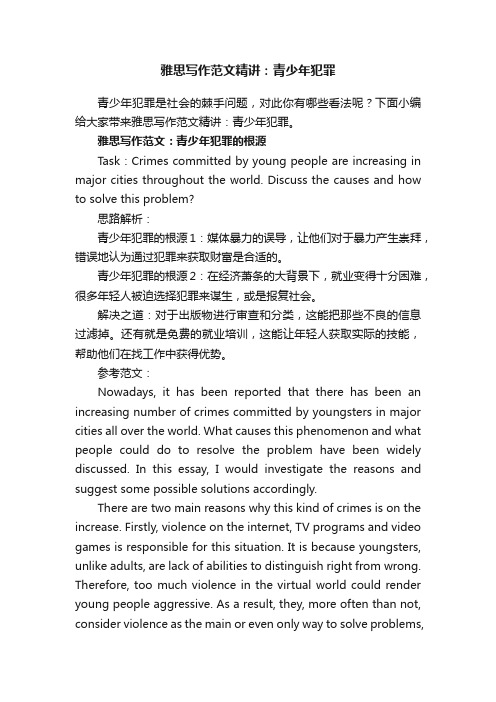
雅思写作范文精讲:青少年犯罪青少年犯罪是社会的棘手问题,对此你有哪些看法呢?下面小编给大家带来雅思写作范文精讲:青少年犯罪。
雅思写作范文:青少年犯罪的根源Task:Crimes committed by young people are increasing in major cities throughout the world. Discuss the causes and how to solve this problem?思路解析:青少年犯罪的根源1:媒体暴力的误导,让他们对于暴力产生崇拜,错误地认为通过犯罪来获取财富是合适的。
青少年犯罪的根源2:在经济萧条的大背景下,就业变得十分困难,很多年轻人被迫选择犯罪来谋生,或是报复社会。
解决之道:对于出版物进行审查和分类,这能把那些不良的信息过滤掉。
还有就是免费的就业培训,这能让年轻人获取实际的技能,帮助他们在找工作中获得优势。
参考范文:Nowadays, it has been reported that there has been an increasing number of crimes committed by youngsters in major cities all over the world. What causes this phenomenon and what people could do to resolve the problem have been widely discussed. In this essay, I would investigate the reasons and suggest some possible solutions accordingly.There are two main reasons why this kind of crimes is on the increase. Firstly, violence on the internet, TV programs and video games is responsible for this situation. It is because youngsters, unlike adults, are lack of abilities to distinguish right from wrong. Therefore, too much violence in the virtual world could render young people aggressive. As a result, they, more often than not, consider violence as the main or even only way to solve problems,thereby leading to crimes. Secondly, low employment rate in many big cities around the world could be another major reason. Most countries are experiencing economic plateau or even backwards due to global economic crisis occurring a few years ago. Consequently, many businesses and factories have decided to cut off their staff or ten d to employ experienced workers over young graduates. This means some youngsters become jobless spontaneously once they graduate. Some of them even turn to commit crimes to make a living or get revenge on society.In order to solve the problem, some main methods are advised accordingly. The first solution is to apply censorship and classification in issuing programs. This means governments or non-governmental organizations should censor the violent and prostitute contents of programs and label them such as "adult only" or "viewers excluded below 14" before programs are publicized. This would help to keep youngsters from too much violence on programs away. Another method is to carry out free job training programs designed closely related to the demand of the job market. After training, youngsters, more of ten than not, can expect better chances of being employed. Other ways could include tax-reduction policy for university graduates self-employment, providing paid social service positions for youngsters, etc.To conclude, methods such as censorship on programs and free job training for youngsters are strongly recommended too much violence on programs and low employment.(370 words)雅思写作大作文高分范文:如何解决青少年犯罪问题In some countries, a high proportion of criminal acts are committed by teenagers. Why has this happened? What can bedone to deal with this?雅思写作题目讲解题目的类型属于report。
雅思写作Task2范文:对电影中的暴力的讨论
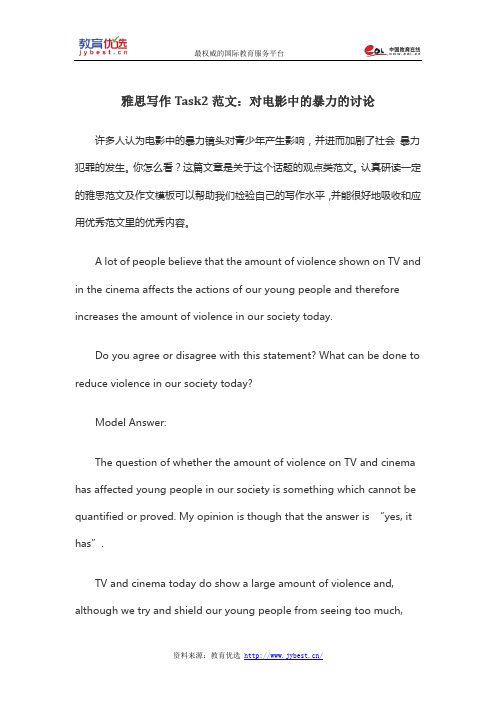
雅思写作Task2范文:对电影中的暴力的讨论许多人认为电影中的暴力镜头对青少年产生影响,并进而加剧了社会暴力犯罪的发生。
你怎么看?这篇文章是关于这个话题的观点类范文。
认真研读一定的雅思范文及作文模板可以帮助我们检验自己的写作水平,并能很好地吸收和应用优秀范文里的优秀内容。
A lot of people believe that the amount of violence shown on TV and in the cinema affects the actions of our young people and therefore increases the amount of violence in our society today.Do you agree or disagree with this statement? What can be done to reduce violence in our society today?Model Answer:The question of whether the amount of violence on TV and cinema has affected young people in our society is something which cannot be quantified or proved. My opinion is though that the answer is “yes, it has”.TV and cinema today do show a large amount of violence and, although we try and shield our young people from seeing too much,they still get to watch it. At the age of eighteen in my country they can see everything anyway. Violence on the streets has increased. That has been proved. The connection between TV?s and the cinema?s obsession with violence and today?s street violence cannot be proved but it is logical that the two are connected. Young people imitate what they see and it is logical that they see glamour in what they do when they commit violence.How can we lessen violence? Reducing the amount of violence on TV and in the cinema would certainly be a good start. Being more vigilant about what age children are when they see violence in these media, and raising the age limits would also help. Another good idea would be to channel the violence of young people. I don?t think that national service should be re-established in this country but, if people are convicted of violence and sent to prison, then why not give them the option of serving in the army. Their violence will be controlled and they will be subjected to discipline so that they will be better able to control themselves when they leave.Thus I agree with the statement that cinema and TV violence affects the young people in our society. There are some things that can be done to better the situation but I doubt whether anything will be done.。
控制电影中的暴力减少犯罪雅思作文
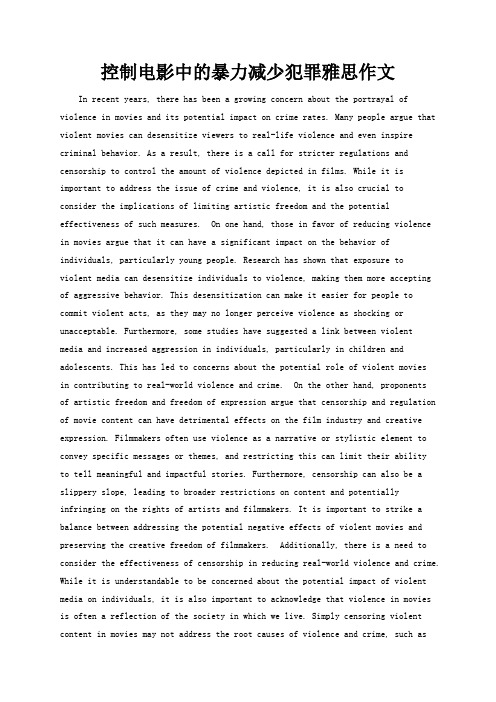
控制电影中的暴力减少犯罪雅思作文In recent years, there has been a growing concern about the portrayal of violence in movies and its potential impact on crime rates. Many people argue that violent movies can desensitize viewers to real-life violence and even inspire criminal behavior. As a result, there is a call for stricter regulations and censorship to control the amount of violence depicted in films. While it is important to address the issue of crime and violence, it is also crucial to consider the implications of limiting artistic freedom and the potential effectiveness of such measures. On one hand, those in favor of reducing violencein movies argue that it can have a significant impact on the behavior of individuals, particularly young people. Research has shown that exposure toviolent media can desensitize individuals to violence, making them more accepting of aggressive behavior. This desensitization can make it easier for people to commit violent acts, as they may no longer perceive violence as shocking or unacceptable. Furthermore, some studies have suggested a link between violent media and increased aggression in individuals, particularly in children and adolescents. This has led to concerns about the potential role of violent moviesin contributing to real-world violence and crime. On the other hand, proponentsof artistic freedom and freedom of expression argue that censorship and regulation of movie content can have detrimental effects on the film industry and creative expression. Filmmakers often use violence as a narrative or stylistic element to convey specific messages or themes, and restricting this can limit their abilityto tell meaningful and impactful stories. Furthermore, censorship can also be a slippery slope, leading to broader restrictions on content and potentially infringing on the rights of artists and filmmakers. It is important to strike a balance between addressing the potential negative effects of violent movies and preserving the creative freedom of filmmakers. Additionally, there is a need to consider the effectiveness of censorship in reducing real-world violence and crime. While it is understandable to be concerned about the potential impact of violent media on individuals, it is also important to acknowledge that violence in moviesis often a reflection of the society in which we live. Simply censoring violent content in movies may not address the root causes of violence and crime, such associal inequalities, lack of access to mental health support, and systemic issues. It is essential to explore comprehensive approaches to addressing crime and violence, rather than solely focusing on media censorship. Moreover, the role of parental guidance and media literacy cannot be overlooked in addressing the potential impact of violent movies on individuals, particularly young people. Parents and guardians play a crucial role in monitoring and guiding the media consumption of their children, as well as facilitating conversations about the content they are exposed to. Additionally, promoting media literacy and critical thinking skills can help individuals, particularly young people, develop a more discerning approach to media consumption and differentiate between fiction and reality. In conclusion, the issue of controlling violence in movies to reduce crime rates is a complex and multifaceted one. While there are concerns about the potential impact of violent media on individuals and society, it is important to consider the broader implications of restricting artistic freedom and thepotential effectiveness of such measures. It is crucial to explore comprehensive approaches to addressing crime and violence, while also empowering individuals to make informed choices about their media consumption. Ultimately, finding a balance between addressing the potential negative effects of violent movies and preserving artistic freedom is essential in addressing this issue.。
雅思英语作文 television 看电视对孩子有害
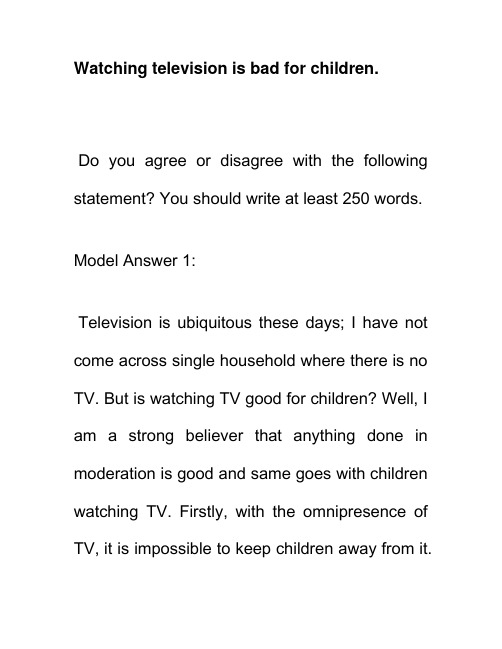
Watching television is bad for children.Do you agree or disagree with the following statement? You should write at least 250 words.Model Answer 1:Television is ubiquitous these days; I have not come across single household where there is no TV. But is watching TV good for children? Well, I am a strong believer that anything done in moderation is good and same goes with children watching TV. Firstly, with the omnipresence of TV, it is impossible to keep children away from it.Moreover, TV provides an efficient source of learning for children if right channels are watched. We generally are able to grasp and remember more things when we see and hear rather than read it and here is where TV is really useful. These days we have different channels focusing only on children like cartoons or more educational channels like animal planet, discovery channel etc. All these channels help in educating children in an effective manner. It is often seen when the children are really young around 1-2 years, they react to TV; whenever a song is being played, they start dancing, and they often listen to songs and starts singing.This definitely suggests that TV helps children in their development and make them active. Admittedly, TV also has some negative impacts on children. Sometimes, they squander too much time in watching TV and watching wrong channels can also have a negative influence on them. Therefore it is of utmost importance that parents keep a close eye on their children. With the advent of technology, we now have televisions with child lock system in place, which could prevent children from watching irrelevant and adult channels. Parents should extol the importance of watching news channels to develop overall general knowledge of children.When I was growing up, my parents made sure that I watch the news for at least half an hour in a day. This really helped me in improving my General Knowledge and I gradually developed the interest in politics and also watching different debates and group discussions helped me improving my speaking skill and as a result, I won several prizes in debates and quizzes at school and college level. In a nutshell, I think as every coin as two sides, so does television. Watching TV in moderation and under parents’ guidance is good for children entertainment and learning but it is important that parents keep a check on the channels that their children watchand the amount of time being spent on watching TV.Model Answer 2:Some parents believe that watching television is bad for their children. So, they try to restrict their children from watching TV. However, other parents think that there is nothing bad in watching TV programmes. Personally, I think that watching TV brings tremendous benefits to the children unless they spend a lot of their valuable time in front of a TV set daily. It is recommended that children should spend less than a couple of hours daily for watching TVprogrammes and those programmes should be suitable for them. For the following reasons, which I will mention bellow, I believe that television plays an essential role in a child's development. First of all, television helps a child to extend his or her range of interests. Children can find out many new things and make many exciting discoveries for themselves. In addition to this practical benefit, television improves children's vocabulary, their memory and gives them the opportunity to gain more knowledge. I think it is essential for a child's growth. Of cause, someone can say that there are plenty of different resources of information such as booksand teachers. But, I think, in our modern world children must learn faster and use all contemporary technology in order to succeed. Secondly, watching cognitive programs helps children to learn more about wildlife, our environment and about the importance of preserving our forest and wild animals that live there. Scientists say that a child should not watch TV more than 40 minutes successively and not more than 2-3 hours per day. For example, my mother always made us have a break after watching TV more than half an hour and let our eyes rest for several minutes before turning on the TV again. She did not let us watchthe TV all day long as well. I think it is the best solution. To sum up, I believe that television gives children and all people the opportunity to learn what can not be learnt from books. Television and movies, in particular, allow people to feel the reality and see what they will most likely not be able to see in their lives. Personally, when I was a child I liked to watch cognitive programs about wild animals. Unfortunately, my family had only one TV, but these programs were the only ones we all wanted to watch. So, we gathered in our living room and watched them in complete silence andI always remember those moments with a smile on my face.。
雅思写作范文及素材:电视对孩子的影响
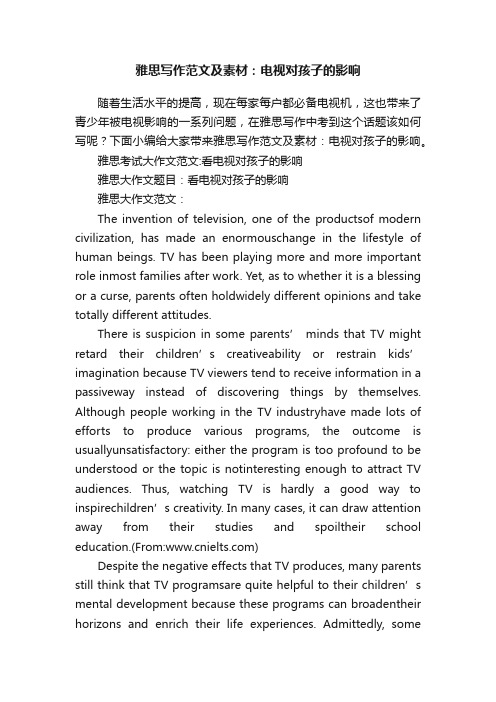
雅思写作范文及素材:电视对孩子的影响随着生活水平的提高,现在每家每户都必备电视机,这也带来了青少年被电视影响的一系列问题,在雅思写作中考到这个话题该如何写呢?下面小编给大家带来雅思写作范文及素材:电视对孩子的影响。
雅思考试大作文范文:看电视对孩子的影响雅思大作文题目:看电视对孩子的影响雅思大作文范文:The invention of television, one of the productsof modern civilization, has made an enormouschange in the lifestyle of human beings. TV has been playing more and more important role inmost families after work. Yet, as to whether it is a blessing or a curse, parents often holdwidely different opinions and take totally different attitudes.There is suspicion in some parents’ minds that TV might retard their children’s creativeability or restrain kids’ imagination because TV viewers tend to receive information in a passiveway instead of discovering things by themselves. Although people working in the TV industryhave made lots of efforts to produce various programs, the outcome is usuallyunsatisfactory: either the program is too profound to be understood or the topic is notinteresting enough to attract TV audiences. Thus, watching TV is hardly a good way to inspirechildren’s creativity. In many cases, it can draw attention away from their studies and spoiltheir school education.(From:)Despite the negative effects that TV produces, many parents still think that TV programsare quite helpful to their children’s mental development because these programs can broadentheir horizons and enrich their life experiences. Admittedly, somescientific, detective anddocumental programs like Discovery and National Geographic are so enlightening andfascinating that even little kids can be absorbed in. Furthermore, some well-chosen programscan motivate young children to diligent studies and in-depth researches. Hence, if parents canselect TV programs carefully, the advantages brought about by watching TV definitely outweighits disadvantages.In summary, TV is like a double-edged sword that can be used in a positive or negativeway. Parents can make their own decisions about whether to have TV at their houses. It is theirresponsibility to make sure that their children’s creativity is enhanced through watching TV.雅思大作文范文解析-孩子是否应该看电视题目Some people think it’s all bad for children to watch TV, others believe watching TV can bring positive effects on children when they grow up. Discuss both views and give your own opinion.题型:双边讨论翻译:有些人认为孩子看电视是不好的,有些人认为看电视可以在孩子长大后给孩子带来正面影响。
托福写作范文:电影电视带来的消极影响大于积极影响
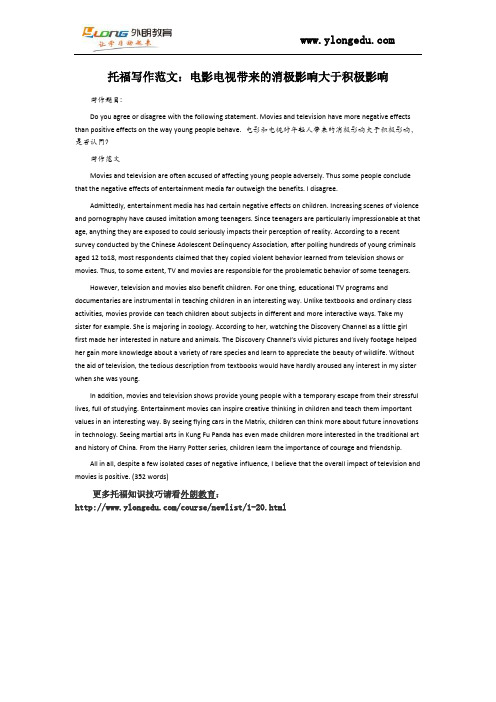
托福写作范文:电影电视带来的消极影响大于积极影响写作题目:Do you agree or disagree with the following statement. Movies and television have more negative effects than positive effects on the way young people behave. 电影和电视对年轻人带来的消极影响大于积极影响,是否认同?写作范文Movies and television are often accused of affecting young people adversely. Thus some people conclude that the negative effects of entertainment media far outweigh the benefits. I disagree.Admittedly, entertainment media has had certain negative effects on children. Increasing scenes of violence and pornography have caused imitation among teenagers. Since teenagers are particularly impressionable at that age, anything they are exposed to could seriously impacts their perception of reality. According to a recent survey conducted by the Chinese Adolescent Delinquency Association, after polling hundreds of young criminals aged 12 to18, most respondents claimed that they copied violent behavior learned from television shows or movies. Thus, to some extent, TV and movies are responsible for the problematic behavior of some teenagers.However, television and movies also benefit children. For one thing, educational TV programs and documentaries are instrumental in teaching children in an interesting way. Unlike textbooks and ordinary class activities, movies provide can teach children about subjects in different and more interactive ways. Take my sister for example. She is majoring in zoology. According to her, watching the Discovery Channel as a little girl first made her intereste d in nature and animals. The Discovery Channel’s vivid pictures and lively footage helped her gain more knowledge about a variety of rare species and learn to appreciate the beauty of wildlife. Without the aid of television, the tedious description from textbooks would have hardly aroused any interest in my sister when she was young.In addition, movies and television shows provide young people with a temporary escape from their stressful lives, full of studying. Entertainment movies can inspire creative thinking in children and teach them important values in an interesting way. By seeing flying cars in the Matrix, children can think more about future innovations in technology. Seeing martial arts in Kung Fu Panda has even made children more interested in the traditional art and history of China. From the Harry Potter series, children learn the importance of courage and friendship.All in all, despite a few isolated cases of negative influence, I believe that the overall impact of television and movies is positive. (352 words)更多托福知识技巧请看外朗教育:/course/newlist/1-20.html。
电影和电视如何影响人们的行为英语作文
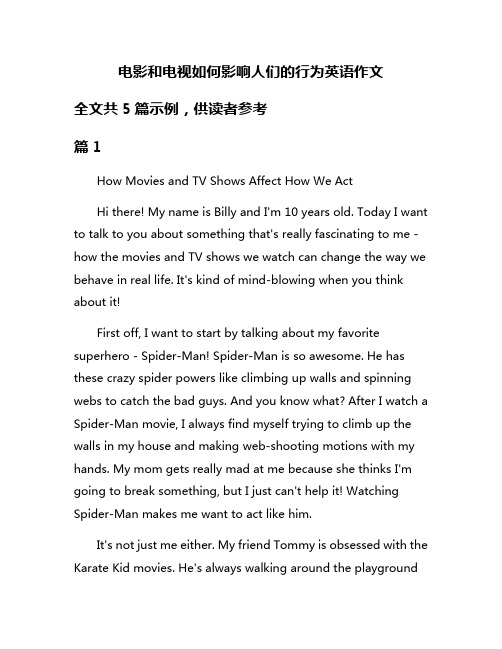
电影和电视如何影响人们的行为英语作文全文共5篇示例,供读者参考篇1How Movies and TV Shows Affect How We ActHi there! My name is Billy and I'm 10 years old. Today I want to talk to you about something that's really fascinating to me - how the movies and TV shows we watch can change the way we behave in real life. It's kind of mind-blowing when you think about it!First off, I want to start by talking about my favorite superhero - Spider-Man! Spider-Man is so awesome. He has these crazy spider powers like climbing up walls and spinning webs to catch the bad guys. And you know what? After I watch a Spider-Man movie, I always find myself trying to climb up the walls in my house and making web-shooting motions with my hands. My mom gets really mad at me because she thinks I'm going to break something, but I just can't help it! Watching Spider-Man makes me want to act like him.It's not just me either. My friend Tommy is obsessed with the Karate Kid movies. He's always walking around the playgrounddoing karate kicks and chops after he watches one of those movies. Sometimes he accidentally kicks me in the shins because he gets so into it! His parents had to stop letting him watch those movies before playdates because he wouldn't stop karate chopping me.I think movies and TV shows affect how we act because the characters we see on screen almost become like real people to us. When we watch them week after week or in movie after movie, we start to look up to them and idolize them. We unconsciously start to mimic how they talk, walk, and behave.My older sister Jessica is boy-crazy. She's always watching these silly teen romance movies and TV shows like Riverdale and To All the Boys I've Loved Before. After she binge watches stuff like that, she starts talking in this weird baby voice and twirling her hair around her finger constantly. It's like she thinks she's one of the ditzy girls from the shows. My dad just rolls his eyes at her when she gets like that.It's not just kids who act differently after watching movies and TV either. I see my mom's behavior change based on what she watches too. Like when she watches reality shows about wealthy housewives, she starts spending more money on clothes, makeup, and jewelry so she can be more "glam." Then whenshe's on one of her true crime show kicks, she gets all suspicious of everybody and triple checks that the doors are locked at night.The craziest example I know is my uncle Steve though. He's a huge fan of gangster movies like The Godfather, Goodfellas, and Scarface. Whenever he's been watching that kind of stuff, he starts talking in this over-the-top Brooklyn accent and calling everybody "paul" or "kid." He'll say stuff like "forgettaboutit!" and make hand gestures like an old-timey mobster. It's hilarious but also kind of uncomfortable.I think deep down we all wish we could be as cool and powerful as the characters we admire on TV and in the movies. By copying how they act, dress, and talk, we're trying to make ourselves a little more like them. We start to idealize their worlds and their lifestyles as exciting and glamorous, even if in reality a lot of it is totally unrealistic.For example, I would never actually want to fight super villains and get beat up constantly like Spider-Man. And I know my uncle doesn't really want to be in the mafia and get whacked by a rival crime family. We're just idolizing the powerful, idealized versions of those characters that we see on screen.Movies and TV also expose us to new cultures, ideas, and ways of life that we might not otherwise get to experience. Whenwe watch shows or movies that take place in other countries, time periods, or communities different from our own, it opens our minds. We might then try to copy some of the behaviors, fashions, or mannerisms from those shows as a way of appreciating and exploring that new culture vicariously.My friend Jamal's family is from India, and sometimes I see him mimicking the animated over-the-top gestures and expressions of characters from Bollywood movies his parents watch. I don't think he's even aware he's doing it - he's just subconsciously picking up on and imitating what he sees on the screen as a way to feel connected to that world.At the end of the day, I think it's normal and natural to be influenced by the movies, TV shows, characters, and celebrities we admire and look up to. They help shape our perceptions of the world and what we view as exciting or desirable. Just don't take it too far! You have to remember that most of what you see on screen isn't realistic. We can have fun copying our favorite characters once in a while, but we shouldn't let it take over our entire personalities or how we behave in the real world.Anyway, that's just my 10-year-old take on this whole phenomenon. Pretty fascinating stuff when you start paying attention to how the media you consume affects your thoughtsand actions, right? Just some innonect kid thoughts for you to chew on. Now if you'll excuse me, I have to go watch my favorite Spider-Man movie again!篇2How Movies and TV Shows Change How We ActHi there! My name is Jamie and I'm 10 years old. Today I want to tell you all about how the movies and TV shows we watch can actually change how we behave and act. It's really fascinating stuff!First off, I love watching movies and TV. My favorite movies are all the Marvel superhero films like Avengers and Spider-Man.I also love watching cartoon shows like SpongeBob SquarePants and animated movies from Pixar like Toy Story. Movies and TV are so much fun and such a great way to be entertained.But did you know that the things we see characters do and say in movies and on TV can shape how we ourselves act in real life? It's true! The shows and movies we watch have a big influence on our behavior. Let me explain how this works.One way movies and TV impact our behavior is through observational learning. This is when we see characters on screen doing certain things, and then we learn to do those same thingsourselves by watching and observing them. It's kind of like how you might learn a new dance move by carefully watching someone else do it first.For example, say there's a really cool character in a superhero movie who has an awesome way of doing a fist bump with their friends. If we think that fist bump looks fun and cool, we might start doing it ourselves when we're with our own friends, copying the character we saw on screen. We learn that behavior through observation.Or let's say there's a character on a TV sitcom who always uses a funny new slang word or phrase when talking to their friends. If the audience thinks that slang is hilarious, they might start saying it themselves around school or on the playground to try to be funny like the character. Again, they learned that behavior just from watching TV.Another way TV and movies impact behavior is through modeling. This is when we observe an admired character doing something, and then we decide to do the same thing because we look up to and admire that character so much.Like if there was a character who was really brave and stood up to the bullies at school, kids watching might then decide to also stand up to bullies more often because that's what theiradmired character did. Or if there was a character who was patient and stayed calm even in frustrating situations, people might try to copy that calm patience because they respect and admire that character.It's kind of like how younger siblings will often try to copy the behavior of an older brother or sister that they look up to. We naturally tend to want to model and imitate the behavior of people we admire.Sometimes this modeling behavior can influence kids in ways their parents might not love. Like if there's a character on a TV show or in a movie who is really sarcastic and sassy when talking back to grown-ups or teachers, kids might think that sassy disrespectful attitude is cool and start copying it themselves. Oops!The Violence FactorUnfortunately, a lot of the behavior we can pick up from observing characters in movies and TV is violence and aggression. Way too many shows and films depict characters resolving their conflicts through physical violence and fighting. And research shows that watching a lot of on-screen violence can sometimes lead to more aggressive behavior, especially among young kids.It's almost like the brain starts to think that using violence to solve problems is normal and okay since we see it happening so often on TV and in movies. Yikes! So parents have to be really careful about monitoring what their kids watch to avoid having them pick up too many violent tendencies. Too much on-screen fighting leads to too much real-life fighting.But it's not all bad! Sometimes movie and TV characters can model really positive and beneficial behavior too. Like if there's a character who stays determined and never gives up even when facing difficulty, kids might feel inspired to develop that same "never quit" mentality themselves. Or if there's a caring character who goes out of their way to be kind and compassionate to others, people might learn to be kinder themselves from watching that character.The Role of AdvertisingIn addition to learning behavior from the characters and stories we see on screen, we can also be influenced by the advertising and commercials we get exposed to surrounding movies and TV. Companies will often design advertising campaigns using the same characters, plotlines, and branding from popular movies and shows in an effort to influence consumers.For example, if there was a really successful and beloved superhero movie, you might start to see commercials and advertisements featuring those same superhero characters trying to sell products like toys, video games, clothing, and snack foods. The goal is to get kids thinking "Wow, if I had that cool Iron Man lunchbox, I'd be just like Iron Man!" And then they beg their parents to buy it for them.Kids are easily influenced by these kinds of advertising tactics leveraging their favorite TV and movie characters. It's just another way the entertainment we consume tries to shape our behavior as consumers.The Positive SideWhile picking up negative behavior like violence or materialism from watching too much TV and movies would obviously be concerning, the influence of on-screen media can also be a positive force when used wisely. Carefully selecting shows and movies that model beneficial behaviors, positive values, intellectual curiosity, and good character can shape kids' development in an uplifting way.For instance, educational TV programs like nature documentaries or historical dramas can expose kids to new ideas and information that satisfies their innate curiosity about theworld and how things work. Getting absorbed in an engaging non-fiction show like that could inspire a child to want to learn more about science, history, or any number of other academic topics.And films or TV series that emphasize themes of friendship, courage, perseverance, and other praiseworthy character traits can absolutely rub off on young viewers in constructive ways. If done right, the stories we enjoy on screen can shape us into becoming kinder, braver, harder-working, more curious, andall-around better people.The Responsibility FactorAt the end of the day, it's all about being a smart and responsible viewer when it comes to movies and television. We have to be aware of the profound ability that the stories and characters we watch have to spark観察学習and模仿行为, for better or worse. It's a powerful influence that shouldn't be taken lightly.So we have to be intentional about curating a healthy media diet, surrounding ourselves with uplifting and enriching shows and movies that will bring out the best in us as people. At the same time, we have to be cautious about mindlessly consumingharmful media filled with toxic messages that could negatively shape our mindsets and decision-making over time.We are what we watch, as they say! The responsibility is on each of us as viewers to be thoughtful and discerning about the movies and TV shows we let influence our lives. If we get smart about managing that influence, the stories we love can inspire us to go forth and be our greatest selves.At least, that's how I see it at 10 years old! Those are just my thoughts on how movies and TV can change how we act and behave. Let me know what you think! Thanks for reading my essay!篇3How Movies and TV Shows Change How We ActHi there! My name is Tommy and I'm a 5th grader. Today I want to talk about movies and TV shows and how they can make people act differently. It's really fascinating stuff!First off, let me give you an example from my own life. A few years ago, my big brother Daniel went through this huge superhero phase where he was obsessed with Spider-Man. He would watch the Spider-Man movies over and over. He even had a Spider-Man costume that he wore all the time! But the funnything was, after watching those movies so much, Daniel started acting like Spider-Man too. He would try climbing up the walls at home and "web-slinging" with pretend webs made from yarn. One time, he even jumped off the roof because he thought he could land safely like Spider-Man! Needless to say, my parents weren't too happy about that.That's just a small example, but it shows how the things we watch can really shape our behavior sometimes. We might start talking like the characters, dressing like them, or even trying to do the same things they do. It's like the made-up world on the screen becomes real to us in a way.There's actually been a lot of research on this by very smart scientists called psychologists. They've found that watching violent movies or TV shows can make some people act more aggressively afterwards. The more violence they see on screen, the more desensitized they can become to real-world violence. That's a pretty scary thought!But it's not just about violence. Psychologists also found that some teenagers started smoking or drinking alcohol because they saw their favorite stars doing it in movies and on TV. Since those celebs looked so cool doing it, the teens wanted to copy that behavior to feel just as awesome.On the positive side, movies and shows can inspire good behavior too. Like when a movie has a brave hero who always does the right thing and stands up to bullies, some kids might feel motivated to be brave like that themselves. Or if there's a character who is really good at math or loves reading books, other kids could be motivated to work harder on those subjects.Another way the media impacts us is through advertisements. We've all seen those really convincing commercials that make new toys or games or foods look unbelievably cool. After watching those ads, kids will beg their parents for those products like crazy! The advertisers are really good at tapping into what kids want and making those items seem like the must-have thing.So in a lot of ways, the stuff we watch on screens has the power to reprogram how we think and what we do. That's why parents and teachers are always saying we have to be careful about too much screen time. The shows and movies we see can really leave strong impressions, especially at a young age.With superheroes being so popular these days, I see examples of kids being influenced by those movies and shows everywhere. Just the other day at school, I saw two boys pretending to shoot webs from their wrists during recessbecause they wanted to be like Spider-Man. And in the lunch room, a bunch of kids were making muscle poses like the Marvel superheroes always do.For me personally, the biggest way movies have affected my interests is through the Star Wars franchise. Ever since my parents let me watch those movies, I've been completely hooked!I have so many of the Star Wars action figures and vehicles. I'm always pretending I get to go on epic space adventures, fighting villains with a lightsaber like the heroes do. Sometimes I even talk a little like Yoda just for fun!I don't think there's anything wrong with being inspired by cool characters from movies and TV as long as we remember to separatefiction from reality. We can admire and copy some of the positive traits, but we have to know where to draw the line. Like I probably shouldn't try using Force powers or swinging a real lightsaber around because I could get badly hurt!At the end of the day, movies and television are pretty much unavoidable nowadays. But as long as we watch them in moderation and don't let the fake worlds take over our real lives, I think they can be an awesome way to spark our imaginations and learn about the world through stories. We just have to be smart about how much we let those stories influence us.Anyway, that's my take on the fascinating way movies and TV shows can shape our behavior! It's a lot to think about for a kid, but I really find this topic interesting. Thanks for reading my essay! May the Force be with you!篇4How Movies and TV Shows Can Change How We ActHave you ever watched a really cool movie or TV show and then started acting like one of the characters? Maybe you dressed up like them, talked like them, or even tried doing some of the things they did. I know I have! Movies and TV shows can definitely affect how we behave. Let me tell you about some of the ways I've seen this happen.One big way is through what psychologists call "modeling" - which just means copying someone else's behavior. When we watch characters on screen, it's almost like they become our friends. We see how they act in different situations and often want to act the same way they do. It's natural for people to imitate those they admire or look up to.I remember after watching The Karate Kid, I started doing karate moves around the house and bothering my little brother. I was pretending to be Daniel LaRusso learning from Mr. Miyagi!My parents weren't too happy about the kicking and punching until I explained I was just modeling what I saw in the movie. They told me to only practice the karate outside from then on.Another time, I got really into The Princess Diaries movies. I loved how confident and graceful Mia was after her princess lessons. I started walking with my head held high and my back straight, just like a proper princess. I even made my mom order me a tiaraoneday because I refused to go anywhere without it! Looking back, I'm sure I looked pretty silly wearing it to school every day.Sometimes kids pick up bad behaviors from shows and movies too. Like if we see a character being mean to others or using inappropriate language, some kids might start copying that. That's why it's important for parents to pay attention to what their kids are watching and discuss it with them.After one of my friends watched a bunch of superhero movies, he got into this phase where he thought he could do all these crazy stunts and tricks. One day at the park, he tried to jump off the monkey bars while pretending to fly and ended up breaking his arm! He admitted later that he was trying to be like the superheroes from the movies. His mom had to be way more careful about what he watched for a while after that.TV shows can influence us too, not just movies. There was this one show I used to love about a group of friends who were all into different things like music, art, sports, etc. After watching it for a while, I realized I had unconsciously started dressing more like the character who loved art and fashion. I was wearing funky clothes and doing my hair differently. My friends even started calling me by that character's name sometimes! We were all just copying the personalities we saw every week on TV.I think kids are especially susceptible to being influenced by the shows and movies they watch because our personalities are still developing. We're just little sponges soaking everything in. But even adults probably adopt certain ways of speaking or behaving from what they see on screen too. It's not always a bad thing though! Media can expose us to new ideas and perspectives that we might not have considered before.After watching movies that took place in other countries, I've sometimes wanted to learn more about those cultures. Or an inspirational book-turned-movie might motivate someone to work harder to achieve their dreams. Seeing someone on screen fight against injustice could spur others to political activism. There are plenty of positive ways movies and TV shows can impact our mindsets and decisions.Overall, I think we just have to be aware of how much the media we consume can shape our behavior - for better or worse. It doesn't mean we can never watch anything fake or silly, but it's good to have balance. We should think critically about what we see and make sure we don't blindly start mimicking every character, even the not-so-good ones. As my dad always reminds me, movies and TV are for entertainment, but real life comes first!Those are just some of my thoughts on how movies and TV shows can change how people act. What do you think? I'd love to hear your perspectives! Maybe we can discuss it over some popcorn while watching a good movie...just don't expect me to jump off any buildings or anything!篇5How Movies and TV Shows Change How We ActHave you ever done something silly because you saw someone do it on TV? Or talked in a funny voice like a character from a movie? I know I have! Movies and TV shows are so much fun to watch, but did you know they can also change how we behave? It's true!The things we see characters do on the screen can influence how we think and act in real life. Sometimes it's in little ways, like using slang words you heard in a show. But movies and TV can also have bigger impacts on behavior, both good and bad. Let me give you some examples.One way they influence us is through the characters we look up to and want to be like. If there's a really cool character that you admire, you might start copying how they dress, talk, or act. Maybe you'll start combing your hair a certain way because you saw the popular kid at school do it after watching a movie.Or perhaps there's a character who is brave, smart, and stands up for what's right. After watching them, you might feel inspired to be more courageous yourself and stick up for your friends against bullies. Seeing examples of good role models can motivate kids to behave better.On the flip side, there are also characters in shows and movies who make bad choices. If you watch people drinking alcohol, using drugs, or being mean and disrespectful a lot, it can start to seem normal or OK. Studies show that kids who watch a lot of violent TV shows or video games are more likely to act aggressive themselves. The fake violence we see can influence us to act violently in the real world, which is scary!Another way the media impacts our behavior is through advertising. You know all those commercials for snacks, toys, and games that come on during kids' shows? Their whole purpose is to make you want to buy those products. And sadly, a lot of kids will beg their parents for the items after seeing them advertised so much. Advertisements are designed to influence your behavior as a consumer.Then there are the stereotypes we see on TV and in movies. Maybe there's a show where the nerdy kids are always bullied and unpopular. Or one where girls are portrayed as only caring about clothes and boys. After seeing those stereotypes over and over, some kids might start acting more like the stereotypes without even realizing it. We have to be careful not to let TV influence us to treat people unfairly based on stereotypes.With all these influences though, the most important thing to remember is that TV shows and movies are fictional and don't always show how people should truly behave. Just because a character does something on a show doesn't mean you should copy it in real life. You have to think for yourself about what is right and wrong based on your own values.It's also good to be aware of all the influences coming from media and advertising. Discuss what you see with parents,teachers, and friends so you can think critically. Don't just blindly copy the shocking or funny behaviors you see characters do. And spend time away from screens too by reading, playing outside, and having real conversations. That way you'll develop your own authentic personality and behavior that isn't too shaped by TV and Hollywood.Movies and television can certainly impact our thoughts and actions in many ways. But as long as we watch wisely and think for ourselves, there's no need to worry. We can enjoy the entertainment while still being our own awesome, unique selves!。
雅思写作大作文思路 电视的消极方面 negatives of television.doc
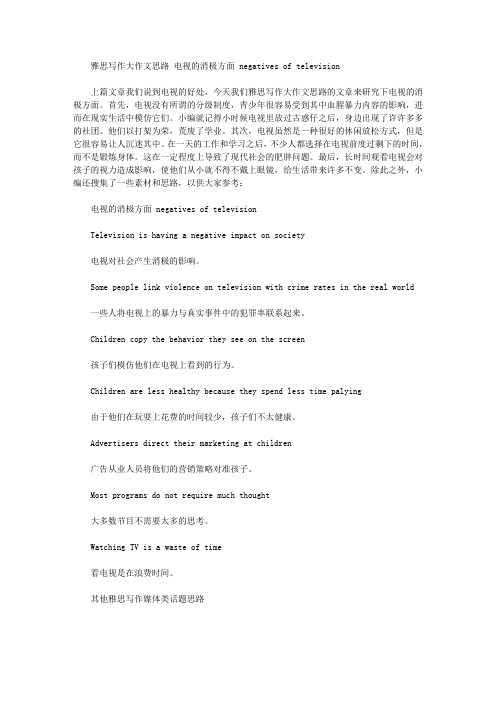
雅思写作大作文思路电视的消极方面 negatives of television上篇文章我们说到电视的好处,今天我们雅思写作大作文思路的文章来研究下电视的消极方面。
首先,电视没有所谓的分级制度,青少年很容易受到其中血腥暴力内容的影响,进而在现实生活中模仿它们。
小编就记得小时候电视里放过古惑仔之后,身边出现了许许多多的社团。
他们以打架为荣,荒废了学业。
其次,电视虽然是一种很好的休闲放松方式,但是它很容易让人沉迷其中。
在一天的工作和学习之后,不少人都选择在电视前度过剩下的时间,而不是锻炼身体。
这在一定程度上导致了现代社会的肥胖问题。
最后,长时间观看电视会对孩子的视力造成影响,使他们从小就不得不戴上眼镜,给生活带来许多不变。
除此之外,小编还搜集了一些素材和思路,以供大家参考:电视的消极方面 negatives of televisionTelevision is having a negative impact on society电视对社会产生消极的影响。
Some people link violence on television with crime rates in the real world一些人将电视上的暴力与真实事件中的犯罪率联系起来。
Children copy the behavior they see on the screen孩子们模仿他们在电视上看到的行为。
Children are less healthy because they spend less time palying由于他们在玩耍上花费的时间较少,孩子们不太健康。
Advertisers direct their marketing at children广告从业人员将他们的营销策略对准孩子。
Most programs do not require much thought大多数节目不需要太多的思考。
Watching TV is a waste of time看电视是在浪费时间。
电影对年轻人有什么影响英语作文
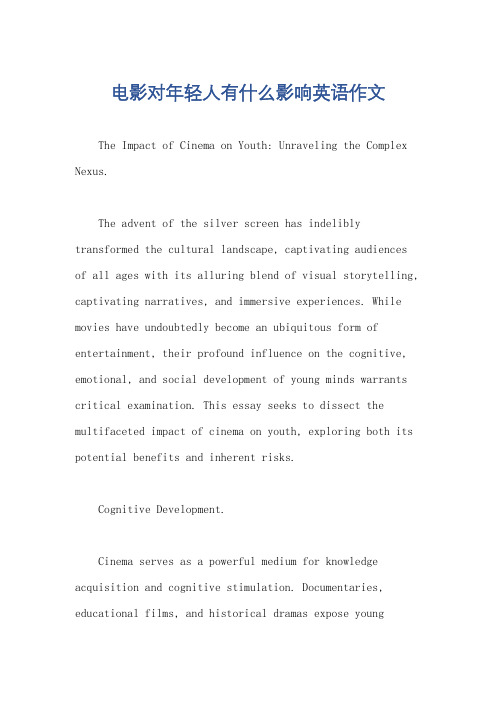
电影对年轻人有什么影响英语作文The Impact of Cinema on Youth: Unraveling the Complex Nexus.The advent of the silver screen has indelibly transformed the cultural landscape, captivating audiences of all ages with its alluring blend of visual storytelling, captivating narratives, and immersive experiences. While movies have undoubtedly become an ubiquitous form of entertainment, their profound influence on the cognitive, emotional, and social development of young minds warrants critical examination. This essay seeks to dissect the multifaceted impact of cinema on youth, exploring both its potential benefits and inherent risks.Cognitive Development.Cinema serves as a powerful medium for knowledge acquisition and cognitive stimulation. Documentaries, educational films, and historical dramas expose youngviewers to a vast array of subjects, broadening their horizons and fostering a curiosity for learning. Through the exploration of diverse characters, cultures, and time periods, movies can stimulate critical thinking, encourage empathy, and promote a greater understanding of the world. Furthermore, the use of symbolism, metaphors, and complex narratives can enhance cognitive flexibility and problem-solving abilities.Emotional Intelligence.Emotions play a pivotal role in human behavior, and cinema has a unique capacity to evoke and shape emotional responses in young viewers. By witnessing the experiences of characters on screen, youth can develop empathy, compassion, and an understanding of their own emotions. Movies can provide a safe and controlled environment for exploring complex feelings, helping youth navigate the challenges of growing up. They can also inspire hope, laughter, and awe, fostering a sense of wonder and resilience.Social Development.Movies often reflect and shape societal norms and values, offering young viewers a glimpse into different cultures and perspectives. By exposing them to diverse characters and lifestyles, cinema can promote tolerance, understanding, and acceptance. It can also provide a platform for discussing important social issues, such as prejudice, inequality, and environmentalism, helping youth develop a sense of social responsibility and activism.Positive Effects on Behavior.While some critics contend that movies can contribute to negative behavior, research has shown that certain types of films can actually have positive effects on youth. Prosocial movies, which depict characters engaging in helpful or altruistic acts, have been found to increase empathy and cooperative behavior in young viewers. Educational films can promote healthy habits, such as physical activity and healthy eating. Documentaries can inspire youth to pursue careers in science, technology, orsocial justice.Potential Risks.Despite the many benefits of cinema, it is important to acknowledge potential risks associated with excessive or inappropriate exposure to movies. Violent or disturbing content can desensitize young viewers to violence and lead to increased levels of aggression. Films that promote unrealistic body images or unhealthy relationships can negatively influence self-esteem and psychological well-being. Moreover, excessive screen time can contribute to sedentary behavior, sleep problems, and social isolation.Mitigating Risks.To maximize the benefits of cinema while minimizing the risks, parents, educators, and policymakers should play an active role in guiding young viewers. By discussing movies with youth, helping them evaluate the content they consume, and encouraging critical thinking, adults can help youth navigate the complexities of the cinematic landscape. Age-appropriate ratings and parental controls can also provide a degree of protection from inappropriate content.Conclusion.The impact of cinema on youth is a complex and multifaceted phenomenon. Movies can play a positive role in cognitive, emotional, and social development, fostering knowledge acquisition, empathy, tolerance, and prosocial behavior. However, it is essential to be mindful of potential risks associated with excessive or inappropriate exposure to movies. Through responsible viewing habits, critical engagement, and parental guidance, young viewers can harness the power of cinema to enhance their lives and develop into well-rounded individuals.。
电影或者电视剧如何影响我们的行为英语作文

电影或者电视剧如何影响我们的行为英语作文The impact of movies and television shows on our behavior is a topic that has been widely discussed and debated. As technology has advanced, the reach and influence of these mediums have only grown, making it increasingly important to understand their effects on our actions and decision-making.One of the most significant ways in which movies and TV shows can influence our behavior is through the portrayal of certain characters and their actions. When we are exposed to characters who engage in particular behaviors, whether they be positive or negative, we can subconsciously begin to emulate those behaviors in our own lives. This is particularly true for young people, who are often more susceptible to the influence of media and may look to these characters as role models.For example, many studies have shown that exposure to violent content in movies and TV shows can lead to increased aggressionand violent behavior in viewers, especially in children. Similarly, the portrayal of substance abuse or risky sexual behavior can also influence viewers to engage in similar activities. On the other hand, the depiction of positive behaviors, such as acts of kindness or heroism, can also inspire viewers to emulate those actions in their own lives.Another way in which movies and TV shows can impact our behavior is through the way they shape our perceptions and beliefs about the world around us. The media we consume can often present a distorted or biased view of reality, which can then become internalized and influence our decision-making and behavior.For instance, the way in which certain groups or communities are portrayed in the media can contribute to the formation of stereotypes and prejudices. If a particular ethnic or social group is consistently depicted in a negative light, viewers may begin to develop negative attitudes towards that group and behave accordingly. Similarly, the portrayal of certain professions or social roles can also shape our expectations and behaviors towards those individuals.Furthermore, the way in which relationships and social interactions are depicted in movies and TV shows can also have a significant impact on our own interpersonal behaviors. The idealized portrayalsof romantic relationships, for example, can lead viewers to develop unrealistic expectations and standards for their own relationships, which can then lead to disappointment and conflict.Additionally, the constant exposure to media can also have more subtle effects on our behavior, such as the way we dress, the way we speak, or the way we consume products and services. The influence of media can be so pervasive that it can even shape our values and beliefs, leading us to prioritize certain behaviors or characteristics over others.However, it is important to note that the influence of movies and TV shows on our behavior is not a one-way street. While these mediums can certainly shape our actions and decision-making, we also have the ability to critically analyze and resist the messages and portrayals that we are exposed to.By developing media literacy skills, individuals can learn to recognize the biases and agendas that may be present in the media they consume, and can then make more informed and thoughtful decisions about their own behavior. This can involve learning to question the authenticity and accuracy of the information presented, as well as the underlying motivations and assumptions that may be driving the content.Furthermore, the influence of movies and TV shows on our behavior can also be mitigated by other factors, such as our own personal experiences, our social and cultural backgrounds, and the support and guidance we receive from our families and communities. By surrounding ourselves with positive role models and engaging in meaningful discussions about the media we consume, we can develop a more nuanced and critical understanding of its impact on our lives.In conclusion, the influence of movies and TV shows on our behavior is a complex and multifaceted issue that deserves careful consideration. While these mediums can certainly shape our actions and decision-making, it is ultimately up to us to critically engage with the content we consume and to make informed choices about how we want to live our lives. By developing media literacy skills and surrounding ourselves with positive influences, we can work to mitigate the negative effects of media and harness its potential to inspire and empower us to be our best selves.。
电视对儿童有不好的影响英语作文
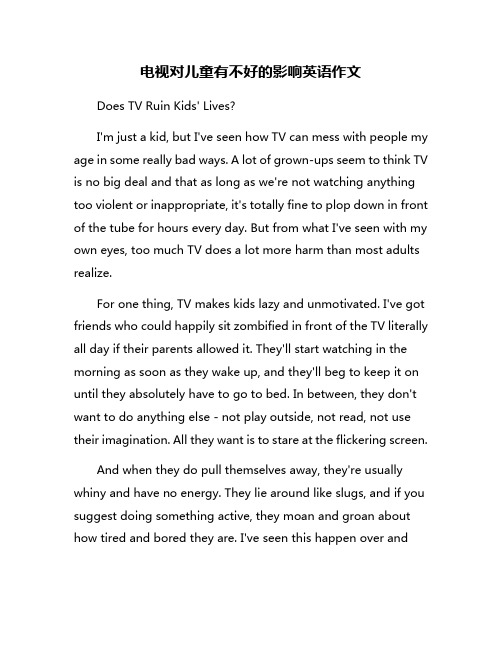
电视对儿童有不好的影响英语作文Does TV Ruin Kids' Lives?I'm just a kid, but I've seen how TV can mess with people my age in some really bad ways. A lot of grown-ups seem to think TV is no big deal and that as long as we're not watching anything too violent or inappropriate, it's totally fine to plop down in front of the tube for hours every day. But from what I've seen with my own eyes, too much TV does a lot more harm than most adults realize.For one thing, TV makes kids lazy and unmotivated. I've got friends who could happily sit zombified in front of the TV literally all day if their parents allowed it. They'll start watching in the morning as soon as they wake up, and they'll beg to keep it on until they absolutely have to go to bed. In between, they don't want to do anything else - not play outside, not read, not use their imagination. All they want is to stare at the flickering screen.And when they do pull themselves away, they're usually whiny and have no energy. They lie around like slugs, and if you suggest doing something active, they moan and groan about how tired and bored they are. I've seen this happen over andover, where kids who watch too much TV just kind of disconnect from the real world and lose their zest for life.TV also seems to shorten kids' attention spans and make it really hard for them to concentrate and focus. In class, the kids who watch a ton of TV are always squirming and looking around the room. They can't sit still and listen for more than a few minutes before they start zoning out or disrupting everyone around them. Then they fall behind on their work and their grades go down the tubes.I know this because my best friend Joel is a major TV junkie. He's one of the smartest guys I know, but he has the worst time paying attention in school. He's always getting in trouble for blurting things out or tapping his pencil because his brain is going haywire from all the fast-paced TV shows he watches. It's like his brain gets rewired to expect constant silly jokes and flashy images to keep him entertained every few seconds.And speaking of silly jokes, that's another way TV is bad for kids. A lot of the comedy shows marketed towards kids these days are just sooooo stupid. They're filled with rude jokes about bodily functions and putting other people down to get cheap laughs. My friend Mason watches this one show where the main characters are constantly ripping big farts and calling each otheridiots, and he started repeating a lot of that gross humor until his parents made him stop watching it.TV also gives kids really unrealistic expectations about how their lives and bodies should look. The Disney shows aimed at girls are the worst - all the actresses are skinny and beautiful with perfect hair and makeup. When regular girls watch that stuff, it can make them feel crummy about themselves and put pressure on them to look and dress a certain way.And don't even get me started on reality shows and YouTube channels...I know kids who want to be "famous" from a very young age just because they've seen seemingly ordinary people celebrated for acting zany and putting their whole lives on display. To me, it seems like a shallow, messed up way to grow up.Bottom line, I think TV does way more harm than good - at least if you overdo it like so many kids do these days. It turns their brains to mush, kills their motivation, shortens their attention spans, teaches them bad values, and gives them unrealistic ideas about their worth and what they should aspire to. I have friends who are basically addicted to TV at this point, and it's really sad and disturbing to see.Now, don't get me wrong, I'm not saying TV itself is purely evil or that I never watch it. I still enjoy a good show every now and then, and there are some educational programs that can be really cool and teach kids about things like history, science, and culture in a fun way. The problem is when TV becomes a crutch or is used as a babysitter for hours and hours on end.I'm lucky that my parents are really strict about how much TV I'm allowed to watch. On school nights, I only get an hour, and even on weekends they enforce time limits and make sure I balance it with other activities like reading, playing outside, doing chores, etc. Sometimes I get annoyed at the rules, but I also know they're doing it because they love me and want me to develop into a happy, healthy, well-rounded kid (and eventually adult).My advice to other kids my age would be: Don't let TV take over your life! Use it as just one small part of your daily routine, not the centerpiece. Get outside, play with friends, find hobbies you're passionate about. And when you do watch TV, be smart about it - avoid the junkiest stuff and look for shows that are genuinely entertaining and enriching, not cheap throwaways that'll rot your brain.If kids could just learn to be moderate and purposeful about their TV habits from an early age, I think it would make a huge positive difference. We'd have a lot more active, curious,kind-hearted, motivated kids in the world - kids who experience the fullness of what life has to offer instead of just absorbing it all through a screen. That's the dream, at least! Maybe if we're lucky, someday it could be a reality.。
《影视作品对青少年的影响》高中生英语作文
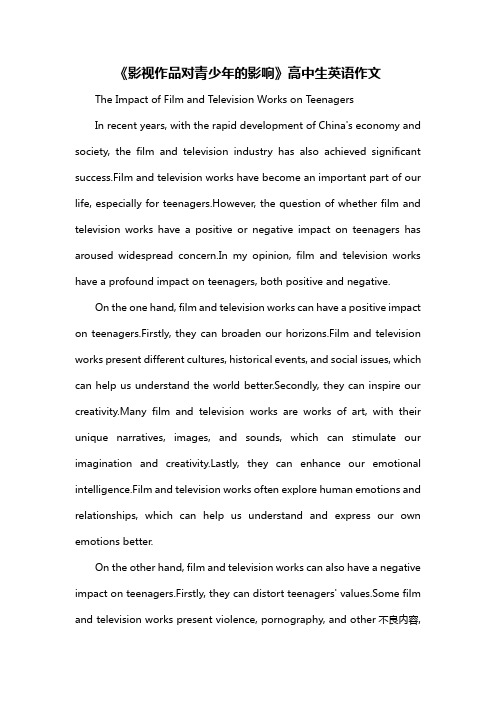
《影视作品对青少年的影响》高中生英语作文The Impact of Film and Television Works on TeenagersIn recent years, with the rapid development of China's economy and society, the film and television industry has also achieved significant success.Film and television works have become an important part of our life, especially for teenagers.However, the question of whether film and television works have a positive or negative impact on teenagers has aroused widespread concern.In my opinion, film and television works have a profound impact on teenagers, both positive and negative.On the one hand, film and television works can have a positive impact on teenagers.Firstly, they can broaden our horizons.Film and television works present different cultures, historical events, and social issues, which can help us understand the world better.Secondly, they can inspire our creativity.Many film and television works are works of art, with their unique narratives, images, and sounds, which can stimulate our imagination and stly, they can enhance our emotional intelligence.Film and television works often explore human emotions and relationships, which can help us understand and express our own emotions better.On the other hand, film and television works can also have a negative impact on teenagers.Firstly, they can distort teenagers' values.Some film and television works present violence, pornography, and other不良内容,which may lead teenagers to misunderstand the value of life and moral standards.Secondly, they can damage teenagers' physical and mental health.Excessive watching of film and television works can lead to eye strain, insomnia, and other physical problems, and some works may also cause psychological stly, they can affect teenagers' learning.Excessive watching of film and television works may lead to a lack of concentration and reduced learning efficiency.In conclusion, film and television works have a profound impact on teenagers.We should choose works that are beneficial to our physical and mental development, and we should avoid those that may cause harm.At the same time, parents, schools, and society should also take measures to guide teenagers in watching film and television works appropriately and healthily.。
雅思写作范文:电视播放犯罪细节好不好
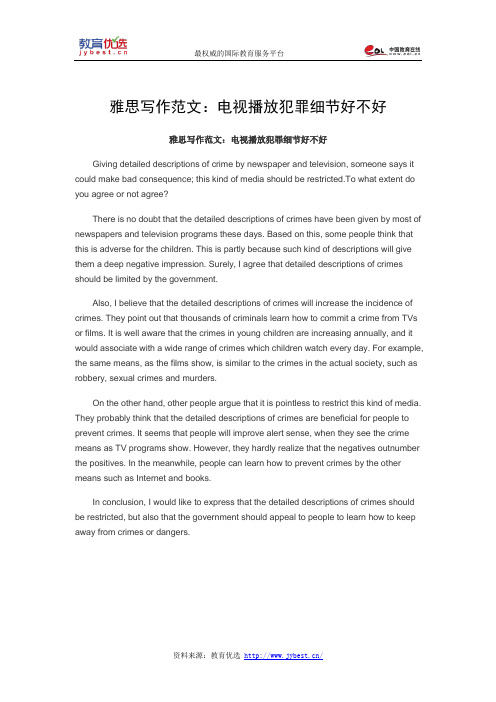
最权威的国际教育服务平台资料来源:教育优选 /雅思写作范文:电视播放犯罪细节好不好雅思写作范文:电视播放犯罪细节好不好Giving detailed descriptions of crime by newspaper and television, someone says it could make bad consequence; this kind of media should be restricted.To what extent do you agree or not agree?There is no doubt that the detailed descriptions of crimes have been given by most of newspapers and television programs these days. Based on this, some people think that this is adverse for the children. This is partly because such kind of descriptions will give them a deep negative impression. Surely, I agree that detailed descriptions of crimes should be limited by the government.Also, I believe that the detailed descriptions of crimes will increase the incidence of crimes. They point out that thousands of criminals learn how to commit a crime from TVs or films. It is well aware that the crimes in young children are increasing annually, and it would associate with a wide range of crimes which children watch every day. For example, the same means, as the films show, is similar to the crimes in the actual society, such as robbery, sexual crimes and murders.On the other hand, other people argue that it is pointless to restrict this kind of media. They probably think that the detailed descriptions of crimes are beneficial for people to prevent crimes. It seems that people will improve alert sense, when they see the crime means as TV programs show. However, they hardly realize that the negatives outnumber the positives. In the meanwhile, people can learn how to prevent crimes by the other means such as Internet and books.In conclusion, I would like to express that the detailed descriptions of crimes should be restricted, but also that the government should appeal to people to learn how to keep away from crimes or dangers.。
1月4日雅思大作文真题参考范文电视播放审判现场是好还是坏?

1月4日雅思大作文真题参考范文电视播放审判现场是好还是坏?2020年1月4日雅思大作文题目电视播放审判现场是好还是坏?In some countries, the criminal trials are shown on the TV and the general public can watch them. Do the advantages outweigh the disadvantages?解析&审题2020年雅思第一考,作文涉及的是犯罪题材。
这是重复2016年10月22日考题。
老雅预测,2020年雅思作文重复较多的应该是2016-2018年题目,大家可以适当多关注这几年的真题。
赞同:(1)看电视审判犯人,我们可以学到很多关于法律的知识(物质层面);(2)电视审判犯人,可以让观众内心感到害怕,从而不敢犯罪(心理层面);(3)电视审判,关注面大,从而使审判显得更加公正(社会层面)。
老师笔记第 1 段Whether criminal trials should be shown on TV or not has always been a controversial issue. After discussing the advantages of this practice and its disadvantages, I come to believe televising criminal trials is a good thing as long as its negative effects are brought well under control.罪犯审判是否应该在电视上播放一直是一个有争议的问题。
在讨论了这种做法的优点和缺点之后,我开始相信,只要负面影响得到很好的控制,电视转播犯罪审判就是一件好事。
解析:(1)本段提出拟讨论的问题,并明确给出自己的观点。
(2) Controversial 有争议的(3) Bring...under control 让......得到控制第 2 段Showing criminal trials on TV can serve multiple purposes at the same time such as educational, deterrent and regulatory. When watching how criminals are tried and sentenced, TV viewers will learn a great deal about the law and the legal system. In fact, it was from a televised trial that I finally understood it is a violation of law if you do not stop your car when you see a stop sign. Meanwhile, TV trials can help bring down the crime rate. People are fearful of their faces shown on TV after they commit crimes because it is generally considered to be a disgrace to the family. Finally, aware that they are watched by the general public, the lawyers and judges will have to make sure that the law is followed strictly and the justice is done to the highest standards.在电视上播放犯罪审判可以同时达到教育、威慑和监管等多种目的。
考研英语作文:影视对行为的影响
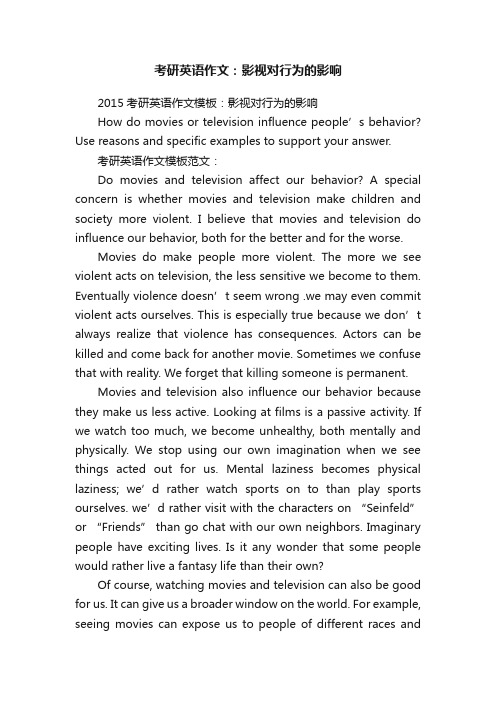
考研英语作文:影视对行为的影响2015考研英语作文模板:影视对行为的影响How do movies or television influence people’s behavior? Use reasons and specific examples to support your answer.考研英语作文模板范文:Do movies and television affect our behavior? A special concern is whether movies and television make children and society more violent. I believe that movies and television do influence our behavior, both for the better and for the worse.Movies do make people more violent. The more we see violent acts on television, the less sensitive we become to them. Eventually violence doesn’t seem wrong .we may even commit violent acts ourselves. This is especially true because we don’t always realize that violence has consequences. Actors can be killed and come back for another movie. Sometimes we confuse that with reality. We forget that killing someone is permanent.Movies and television also influence our behavior because they make us less active. Looking at films is a passive activity. If we watch too much, we become unhealthy, both mentally and physically. We stop using our own imagination when we see things acted out for us. Mental laziness becomes physical laziness; we’d rather watch sports on to than play sports ourselves. we’d rather visit with the characters on “Seinfeld” or “Friends” than go chat with our own neighbors. Imaginary people have exciting lives. Is it any wonder that some people would rather live a fantasy life than their own?Of course, watching movies and television can also be good for us. It can give us a broader window on the world. For example, seeing movies can expose us to people of different races andcultures. We can then overcome some prejudices more easily. Recently there have been more handicapped people in films, and this also helps reduce prejudice.The best influence on our behavior is that movies and television reduce stress. Watching films, we can escape our own problems for a little while. Also, sometime movies show positive ways to resolve problems we all face. While TV and movies shouldn’t be a way to hide from life, sometimes they can help us cope.It is true that movies and television can influence our behavior negatively. However, I also believe that they influence our behaviors in positive ways. How they affect you depends on how much you watch, what you watch, and how you respond to what you watch.。
- 1、下载文档前请自行甄别文档内容的完整性,平台不提供额外的编辑、内容补充、找答案等附加服务。
- 2、"仅部分预览"的文档,不可在线预览部分如存在完整性等问题,可反馈申请退款(可完整预览的文档不适用该条件!)。
- 3、如文档侵犯您的权益,请联系客服反馈,我们会尽快为您处理(人工客服工作时间:9:00-18:30)。
下面是一篇关于媒体中的暴力的雅思大作文写作范文,在这篇雅思大作文范文中主要讨论了应该如何控制电视和电影中的暴力镜头的数量以减少少年暴力犯罪在社会上的发生。
在何种程度你同意还是不同意这个观点呢?下面是环球雅思介绍的详细内容。
雅思大作文题目:
The government should control the amount of violence in films and on television in order to decrease the violent crimes in society. To what extent do you agree or disagree with this issue?
You should write at least 250 words. You should use your own ideas of knowledge and experience and support your arguments with examples
and relevant evidence.
雅思大作文范文:
Nowadays there is a large amount of violence in films and on television. I agree that the government should take some effective measures to control the amount of the violence in order to decrease the violent crimes in society.(段首明确观点)
Although we cannot establish a simple, direct, cause-and-effect relationship between media violence and violence in our society, there has been extensive research indicating that those who as children are exposed to violent TV shows or films are much more likely to later be convicted of crime. Because as the main mass media, TV and films can be a powerful influence in developing value systems and shaping behavior, especially to the young people. A case in points that the study shows girls who watch more than an average amount of violence tend to throw things at their husbands, and boys who grow up watching violent TV shows are more likely to be violent with their wives.(举例证明观点)
Another reason is that too much media violence makes people become "immune" to the horror of violence and gradually accept violence as a way to solve problems. They may think society justice cannot be realized in reasonable and fair ways. Violence worship becomes more and more popular among some young people, which will pose a potential danger to the security of society.(进一步阐述观点)
The government should be aware that TV or film violence would not disappear even if the harms can be realized widely. Violence is being used as a superficial way to attract and hold audience. In order to decrease the violent crimes in society the government should establish strict laws to control or even prohibit the violence on TV and in
films. (结尾点题,并呼应起初所提出的观点)
以上就是这篇雅思大作文写作范文之电视电影对于少年犯罪的影响的全部内容。
这篇雅思大作文写作题目是非常经典的媒体和政府的结合,文章采用了总分总的传统写作形式,结构清晰,用词准确。
雅思大作文范文中的句型和段落结构安排,以作为参考,并注意字数的控制。
最后,环球雅思祝大家的雅思写作得高分!。
